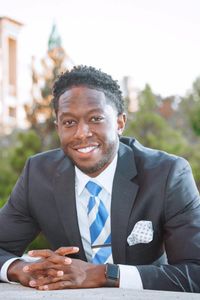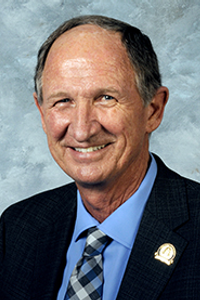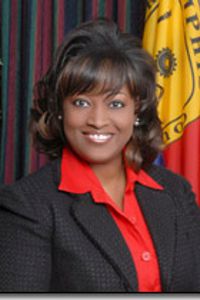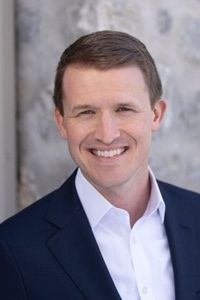Barrington Martin II
Barrington Martin II was a little-known Democratic candidate who ran an uphill campaign against incumbent Congressman John Lewis in Georgia’s 5th Congressional District in 2020. Despite facing nearly insurmountable odds against the civil rights icon Lewis, Martin persevered through two elections that year in hopes of bringing new progressive ideas to Congress.
The Young Underdog Takes On A Legend
Martin’s Background
Barrington Martin II grew up in Georgia and earned degrees in political science and African American studies from the University of Georgia. Prior to running for Congress, he worked as a paralegal, freelance writer, tutor, and special education teacher.
Unlike Lewis, who grew up in rural Alabama during the Jim Crow era and had been involved in civil rights activism since a young age, Martin did not have a high profile background in politics or activism. At just 30 years old in 2020, he was running against a national figure who had served in Congress for over 30 years.
Why Martin Ran Against Lewis
Martin explained that he entered the race because he felt it was time for a “new kind of trouble” in Georgia’s 5th District. He criticized Lewis and the Democratic Party establishment for being out of touch with the economic realities facing younger Americans.
In an interview, Martin said: “As times change, the party must change with it. I have been stirring up the good trouble Congressman Lewis has told us, but now it’s time for new trouble.”
He believed new, progressive leaders were needed in Congress to fight for issues like Medicare for All, a Universal Basic Income (UBI), and student debt forgiveness.
The People’s Bailout: Martin’s Progressive Policy Platform
Universal Healthcare and UBI
The centerpiece of Martin’s campaign was something he called “The People’s Bailout.” This included establishing universal healthcare through Medicare for All so that all Americans would have their health needs covered.
He also advocated for a nationwide UBI system to guarantee a basic standard of living for all and allow Americans to pursue their dreams unburdened by economic anxiety. Martin viewed the UBI as a way to inject consumer spending into the economy and stimulate growth.
Student Loan Forgiveness
With younger voters weighed down by massive student debt, Martin made student debt forgiveness a key plank in his platform. He joined Democratic candidates like Bernie Sanders and Elizabeth Warren in pushing for broad student loan forgiveness programs.
Martin argued that relieving Americans of their student debt burdens would allow them to more actively participate in the economy, buy homes, start businesses, and invest in their communities.
Other Priorities
In addition to the main planks of the People’s Bailout, Martin called for criminal justice reform including demilitarizing the police, legalizing marijuana, abolishing private prisons. He also wanted to strengthen labor rights and raise the federal minimum wage to $20 per hour.
Battling John Lewis in the Democratic Primary
Lewis’ Career and Accomplishments
To unseat John Lewis in a Democratic primary was no easy feat. Lewis had represented Georgia’s 5th District for over 30 years and had been a major figure in the civil rights movement since the 1960s.
He was one of the original Freedom Riders who challenged segregated bus terminals in the South and was the youngest speaker at the 1963 March on Washington. Lewis was brutally beaten by police on the Edmund Pettus Bridge during the 1965 Selma to Montgomery marches. His courage facing violent racism earned him the nickname “the conscience of Congress.”
With this background, Lewis was deeply beloved figure among liberals and widely respected by politicians from both parties. Ousting him would be a monumental undertaking for any candidate.
The Primary Campaign
Martin campaigned aggressively, touting his People’s Bailout policies and casting himself as the progressive alternative to Lewis’s old guard politics. He criticized Lewis as being beholden to corporate donors and argued that a young voice was needed to push the Democratic Party in a more transformative economic direction.
However, Lewis had the overwhelming advantage when it came to name recognition, endorsements, and fundraising. Major figures like Stacey Abrams, Barack Obama, and Nancy Pelosi all backed Lewis. He also massively outspent Martin, flooding the district with ads touting his leadership experience.
Ultimately, Martin faced extremely long odds taking on such an icon of the Georgia Democratic Party.
Primary Results
In the June 9 primary, Lewis defeated Martin by a landslide margin of 87.6% to 12.4%. Lewis received over 140,000 votes while Martin garnered just over 20,000. The lopsided results demonstrated Lewis’s strong support after more than three decades representing the district.
Martin congratulated Lewis on his victory and vowed to continue pushing progressive policies. However, Lewis tragically passed away in July from pancreatic cancer just weeks after the primary.
The Special Election After Lewis’s Death
The Opportunity of an Open Seat
Following Lewis’s untimely death, a special election was called to fill his vacant House seat. With Lewis no longer on the ballot, Martin saw an opportunity to compete in an open race rather than challenge an incumbent.
Seven Democrats, including Martin, entered the special election field along with Libertarian Chase Oliver. This fractured the Democratic vote and gave the little-known Martin a chance if he could stand out from the pack.
Martin’s Final Campaign
Martin reused much of the same messaging from his primary run, touting the People’s Bailout and casting himself as the progressive champion. With Lewis gone, he was able to more directly criticize the Democratic establishment without appearing to attack a civil rights legend.
Campaigning through the summer of 2020, he advocated for transformative New Deal-style economic policies to provide financial security for all Americans. His proposals included a federal jobs guarantee, universal childcare and housing programs, postal banking, and greater worker representation on corporate boards.
Martin believed the COVID-19 pandemic had exposed the inadequacies of America’s social safety net and that bold action was needed to remedy wealth inequality.
A Crowded Democratic Field
Martin faced an uphill climb even without Lewis on the ballot. The six other Democrats included state senator Nikema Williams, state representative Mable Thomas, former Morehouse College President Robert Franklin, and Atlanta city council members Kwanza Hall, Keisha Waites, and Andre Dickens.
This split the Democratic electorate into competing factions based on geography, race, ideology, and institutional support. With no dominant frontrunner, it became a very fluid race.
The Special Election Results
Vote Split Among Many Candidates
In the September 29 special election, the vote among the Democrats was divided almost evenly between the seven contenders. This prevented any one candidate from consolidating party support.
Martin finished fifth with just 5.6% of the vote. The top two candidates, Hall and Franklin, finished with only about 30% each. They advanced to a runoff, while the rest were eliminated.
Martin Out of The Running
Martin’s progressive platform failed to gain enough traction to make the runoff. The fractured Democratic field disadvantaged a relatively unknown candidate like him who lacked a geographic or demographic base.
With under 2,000 votes, Martin again demonstrated little viability against much better funded, prominent local Democrats. However, he believes his ideas can catch on if messaged effectively.
Kwanza Hall’s Victory
In the December 1 runoff, Kwanza Hall defeated Robert Franklin to win the seat. As an Atlanta city councilman, Hall had the highest name recognition in the city portion of the district. This proved decisive in the low turnout runoff.
Hall will serve out the remainder of Lewis’s term until January 2023. He has indicated he will take a more moderate stance than Martin, but supports robust pandemic relief spending.
Martin’s Campaign Legacy and Future Outlook
Shining Light on Progressive Policies
While he fell far short of victory, Martin’s spirited challenge did succeed in highlighting major planks of the progressive policy agenda. On the campaign trail, he engaged voters about Medicare for All, UBI, student debt relief, criminal justice reform, and other issues.
In the post-campaign interview, he said: “We’re at the forefront of a political renaissance in which the people deserve more, and it’s time for our government to finally deliver.”
So despite his loss, Martin advanced the discussion around several proposals gaining steam on the political left.
Gaining Valuable Experience for the Future
Running as a first-time candidate against titans like John Lewis and other entrenched local Democrats was a valuable learning experience for Martin. He got to test his messaging and political skills on the biggest stage.
The visibility and connections gained from these races could aid Martin in any future campaigns. At just 30 years old, he has ample time to refine his platform and continue advocating for progressive policies around Georgia.
Uphill Battle Remains for Leftists in Georgia
However, the dual defeats do indicate the difficulty leftist candidates still face in more moderate states like Georgia. The decisive losses suggest the Democratic electorate remains skeptical about ideas like Medicare for All and UBI.
Martin will have to work to build grassroots support and change perceptions around his democratic socialist policies if he hopes to mount a viable campaign in the future. But he seems undeterred.
Georgia’s 5th District remains his most logical path back to Congress. But the field will be crowded again in 2022 with candidates boasting stronger political pedigrees. Breaking through remains an uphill climb for Barrington Martin II.
Conclusion
Barrington Martin II represented an insurgent progressive voice within the Georgia Democratic Party during the contentious 2020 election season. He challenged incumbent John Lewis from the left in the primary before Lewis’s untimely death opened up the seat in a special election free-for-all. Despite running an spirited campaign centered around economic justice issues, Martin never garnered more than 12% of the vote against much better known rivals. But the 30-year old teacher turned candidate gained valuable experience which could aid future runs for office. His ideological platform helped spur debate around proposals like Medicare for All and UBI that are growing in popularity within the party’s left flank. Barrington Martin II remains unlikely to hold national office anytime soon given his lack of traction in his two 2020 House campaigns. However, he will continue advocating for progressive policies in Georgia and shaping the Democratic Party’s future direction as new leaders like Stacey Abrams rise to prominence.
FAQs
Q: What were Barrington Martin II’s key policy proposals in his 2020 campaigns?
A: Martin centered his campaign around his “People’s Bailout” plan, which called for Medicare for All, a Universal Basic Income, student debt forgiveness, criminal justice reform, a $20 minimum wage, and other progressive priorities.
Q: How did Martin perform in the Democratic primary against John Lewis?
A: Lewis defeated Martin by a landslide margin of 87.6% to 12.4% in the June 2020 primary. Lewis’s name recognition, funding, and support among Georgia Democrats was overwhelming.
Q: Why did Martin run in the special election after losing to Lewis?
A: With Lewis’s passing, Martin saw an open seat opportunity in a crowded field without facing the advantages of an incumbent. However, he still finished 5th out of 7 candidates.
Q: What experience did Martin gain from his 2020 campaigns?
A: Despite falling short, Martin gained visibility, campaign experience, and contacts that could aid potential future runs for office in Georgia.
Q: What are Martin’s prospects moving forward?
A: Martin faces an uphill battle to win a Congressional seat given his lack of political base. But he can continue shaping Georgia’s policy debates and potentially build a broader coalition over time.








